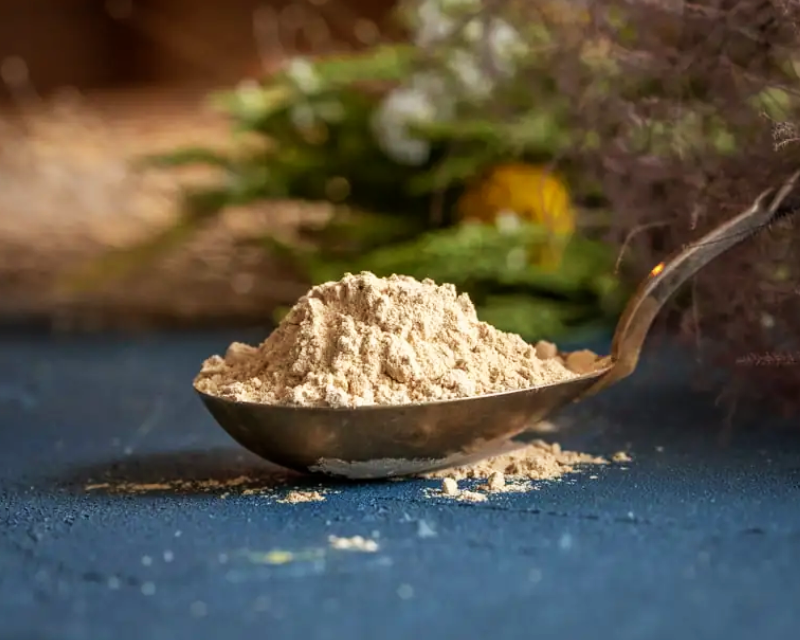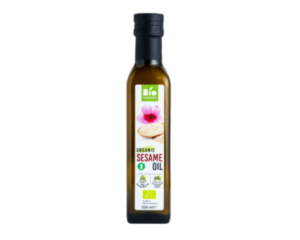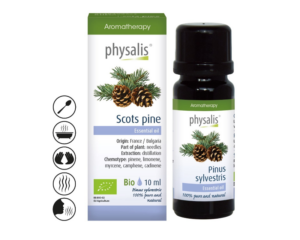Organic Indian gooseberry fruit powder
From 2.30€
Organic Indian leaf fruit powder Amla
Thousands of years before Nobel Prize-winning scientist Linus Pauling presented evidence of the healing powers of vitamin C, Ayurvedic doctors used Amla (often called Indian gooseberry) as a healing agent. Amla is one of the most antioxidant-rich fruits found in nature. Amla’s many benefits and uses have been investigated, including boosting immunity; protecting against oxygen-damaging free radical damage to cells; and can slow the ageing process.
Amla (Phyllanthus emblica) belongs to the Euphorbiaceae family and ripens in autumn in the moist forests and hills of the Indian subcontinent. The tree that bears this beautiful fruit is considered sacred in India, where Amla is often eaten with salt and chilli powder, or used to make pickled snacks or candied sweets. Although Amla is sour, when eaten raw it leaves a sweet aftertaste. Paradoxically, this sour fruit is a potential stomach acidifier and is often used in Ayurvedic medicine to treat stomach problems, ulcers, heartburn and acid reflux.
Amla can help fight some systemic health conditions and mitigate cell damage. Herbalist Vidhi Bhatia wrote that the use of Amla “comes from the 5000-year-old traditional Indian system of medicine, Ayurveda, a discipline focused on promoting good health, supporting the immune system, rejuvenating and revitalising the body and the body.
It is estimated that 100 grams of raw Amla contains 478 mg of vitamin C. By comparison, a lemon contains 77 mg of vitamin C per 100 grams.
As a food rich in vitamin C, Amla supports the adrenal glands, which are used for cellular energy and to maintain skin and blood vessel health. Amla has been used to relieve constipation and other abdominal health problems. Amla can also be an excellent anti-inflammatory.
Amla’s healing properties were originally due to its high vitamin C content. Research is now revealing that it is actually a combination of all the active ingredients that provide the cure, prevention and promotion of health.
The fruit is also considered to be an exfoliant and astringent. Regular use is said to result in younger-looking and firmer skin. It is often used to make hair shinier and healthier.
The recommended daily intake is ¼ to ½ teaspoon with warm water once or twice a day.
Attention
Amla is an adaptogenic herb that is generally considered safe to take.
There is some evidence to suggest that iron deficient individuals should be cautious as amla can form chelates with iron and thus reduce the amount of beneficial iron in the blood.
For those who are pregnant, lactating or taking medication, we recommend that you consult your doctor or an Ayurvedic practitioner before taking amla. Keep out of the reach of young children!
Sources:
National Library of Medicine
EasyAyurveda
BanyanBotanicals
Researchgate
NOTE. The information contained herein should not be construed as a recommendation for treatment or other health issues. We encourage you to make personal decisions about your personal health, taking into account a wide range of sources of information.
100% Amla fruit
Energy 1329 kJ/ 316 kcal
Fat 0.5 g
- of which saturates 0.0 g
Carbohydrate 64.5 g
- of which sugars 8.4 g
Fiber 27.0 g
Protein 0.4
Salt 0.3 g
*Values may vary according to variations in various.
Store in a dry, cool and dark place.


